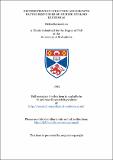Differentiation induction and growth factor responses of murine myeloid leukemias
Abstract
Current therapeutic regimes for the treatment of acute myeloid leukaemia employ aggressive cytotoxic strategies which have limited success and are not suitable for all patients. Manipulating myeloid leukaemic cells according to their responses to pharmacologically tolerable agents rather than employing aggressive non specific cell kill would be desirable. Differentiation induction of myeloid leukaemic cells as an alternative therapeutic regime was evaluated. To elucidate the growth and differentiation abnormalities of myeloid leukaemic cells the differentiation induction and growth factor responses of bone marrow from three myeloid leukaemic models (SA2, SA7, SA8) and a leukaemic cell line (SA2 CL) were investigated in microtitre suspension cultures and compared with normal. The regulators of normal haemopoiesis occupy a key position in attempts to understand the nature of the abnormal state existing in myeloid leukaemia and could potentially play an important role therapeutically by suppressing myeloid leukaemic populations. To evaluate differentiation induction as an alternative therapeutic regime for the treatment of myeloid leukaemia both the physiological regulators and the differentiation inducer β-all trans retinoic acid (βatRA) alone and in combination with ara-C were investigated. The effects of these agents directly on the leukaemic clonogenic cell populations in vitro were measured following in vivo transplantation. The proliferative effects of WEHI-3B CM, as a source of IL-3, L929 CM as a source of M-CSF, and recombinant murine GM-CSF alone and in combination were investigated. Bone marrow cells from the SA7 and SA8 transplanted leukaemias were growth factor dependent for proliferation in vitro. The SA2 transplanted leukaemia proliferated autonomously at low passage numbers, the dominant leukaemic clone changed characteristics with progressive transplantation and became growth factor dependent at high passage numbers. A cell line (SA2 CL) was derived from leukaemic bone marrow cells of a low passage number of the SA2 leukaemia and proliferated at a high rate autonomously with minimal spontaneous differentiation in culture. The growth factor dependent leukaemias were induced to proliferate with each of the growth factors. No differences were observed in the dose response relationships between normal and leukaemic cells. Differences were observed in the proliferative rates, the day to which exponential cell growth was sustained in culture and the growth factor which induced maximal proliferation. WEHI-3B CM induced the maximal proliferative response of normal bone marrow cells and two of the leukaemias whereas rGM-CSF induced a maximal response of the third leukaemia. Leukaemic cells proliferated at a higher rate than normal cells in the first two to three days in culture but were not sustained in culture for as long as normal bone marrow cells. It appeared therefore, that in the case of some leukaemias the haemopoietic growth factors were effective at inducing a high initial but short term proliferative response of leukaemic cells and were more effective in sustaining normal bone marrow cells in vitro. (Abstract shortened by ProQuest.)
Type
Thesis, PhD Doctor of Philosophy
Collections
Items in the St Andrews Research Repository are protected by copyright, with all rights reserved, unless otherwise indicated.

